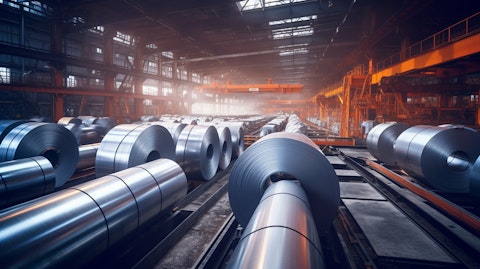We recently compiled a list of the 10 Best Aluminum and Aluminum Mining Stocks to Buy Now. In this article, we are going to take a look at where Kaiser Aluminum Corporation (NASDAQ:KALU) stands against the other aluminum and aluminum mining stocks.
Aluminum is one of the most crucial raw materials in the world. The modern transportation industry heavily relies on this shiny metal due to its lightweight and high strength, making it ideal for cost-efficient applications like aircraft.
Sector Performance
Industrial metals, including aluminum, have been swept up in global stock market turmoil due to fears of a deeper U.S. economic slowdown and rising bets on an emergency rate cut by the Federal Reserve, after a weaker-than-expected July jobs report. Concerns over China’s economic performance, particularly its sluggish factory activity, have further dampened sentiment. China’s ongoing property market crisis continues to weigh heavily on aluminum demand, with no clear signs of a turnaround. The combination of weak factory output and a struggling property sector has led to muted GDP growth expectations for the third quarter of 2024, putting additional downward pressure on global aluminum prices.
That said, China’s aluminum production is hitting record highs, with output expected to grow by 2% in 2024, reaching 42 million tons due to the recovery of power supply in Yunnan. While this boosts global supply, it risks worsening the oversupply issue in a market with weak demand. Rising inventories on the London Metal Exchange, now at their highest since 2021, underscore this imbalance, as spot demand remains soft.
Despite these challenges, there is optimism for a recovery in Q4 2024, with aluminum prices expected to rise to $2,550/t if the U.S. Federal Reserve cuts rates, which could ease borrowing costs. However, inflation and high interest rates remain potential risks that could dampen demand further.
Aluminum Market
The U.S. Aluminum market was valued at $12.47 billion in 2023 and is forecasted to surge to $17.94 billion by 2030, reflecting a CAGR of 4.6% from 2024 to 2030.
The 2023 Ducker Carlisle survey highlights a significant increase in aluminum content in vehicles, driven by the push for sustainable transportation. From 2020 to 2030, aluminum content per light vehicle is expected to rise by nearly 100 pounds, reaching 556 pounds. This growth is fueled by aluminum’s use in electric vehicles to extend range and offset battery weight, with electric light trucks like the Ford F-150 Lightning projected to have over 644 pounds of aluminum content. Leading manufacturers are investing in R&D to support these developments.
As discussed previously in one of our articles 11 Best Aluminum and Aluminum Mining Stocks To Buy, China ranks first in aluminum production with an annual output of 41 million tons, which is ten times greater than the second-largest producer, India, with an annual production of 4.1 million tons.
Making Aluminum Production Sustainable
Decarbonization efforts are critical to the aluminum industry, just like they are to the rest of the global sectors. The best-performing producers emit around 4 tons of CO2 per ton of aluminum, far below the global average of 16 tons. Achieving such low emissions requires access to zero-carbon electricity and further technological innovations to push these numbers even lower.
Decarbonization efforts are central to the First Movers Coalition (FMC), which encourages the use of low-carbon primary aluminum. The industry is also exploring two pathways for reducing emissions in refining: quick deployment of innovative technologies or a more gradual approach that addresses barriers. Key technologies include electric boilers, hydrogen calcination, and inert anodes for smelting, all of which aim to significantly reduce emissions when paired with renewable energy sources.
If you check out our article Aluminum Consumption By Country: Top 15, you’ll find that while China was the largest producer, South Korea led in consumption, with nearly 43 kg consumption of aluminum per person in 2022. An interesting fact to note is that, although China produced the most aluminum, Canada was the world’s largest aluminum supplier, with Canadian aluminum exports reaching $9.37 billion in 2022, according to a report by the Observatory of Economic Complexity.
Methodology
For this list, we scanned Insider Monkey’s database of 912 hedge funds and identified companies that are involved in the production, extraction, processing, or sale of aluminum and aluminum-related products. From that group, we picked the top 10 companies with the highest number of hedge fund investors having stakes in them, as of Q2 2024.
Moreover, we also individually researched these stocks to collect analysts’ consensus over the respective stocks’ upside potential. The stocks are ranked in ascending order of the number of hedge funds investing in them as of Q2 2024. For the stocks with equal hedge fund investors’ holders, we ranked them according to their respective upside potential.
Why are we interested in the stocks that hedge funds pile into? The reason is simple: our research has shown that we can outperform the market by imitating the top stock picks of the best hedge funds. Our quarterly newsletter’s strategy selects 14 small-cap and large-cap stocks every quarter and has returned 275% since May 2014, beating its benchmark by 150 percentage points (see more details here).

An aerial view of an aluminum mill, showcasing the company’s production capabilities.
Kaiser Aluminum Corporation (NASDAQ:KALU)
Number of Hedge Fund Holders: 19
On our list of the 10 best aluminum stocks to buy, we have Kaiser Aluminum Corporation (NASDAQ:KALU), which is a prominent producer of semi-fabricated aluminum products, serving manufacturers and suppliers worldwide. Kaiser Aluminum, with 13 production facilities across North America, produces a diverse range of value-added products, including plate, sheet, coil, and extrusions such as rod, bar, tube, and wire.
In Q2 2024, Kaiser Aluminum Corporation (NASDAQ:KALU) experienced a net sales drop to $773 million from $814 million a year ago, driven by a 6% reduction in shipments. Despite this, aerospace/high strength and automotive extrusions segments showed growth, with aerospace/high strength sales at $226 million and automotive extrusions rising 9% to $70 million. Net income fell to $3 million from $18 million in the prior year, largely impacted by a $9 million non-cash LIFO charge and costs associated with closing the Sherman, Texas facility.
On the liquidity front, Kaiser Aluminum is well-positioned with $70 million in cash and a credit facility of $548 million, providing total liquidity of $618 million. Considering the company’s performance, a quarterly cash dividend of $0.77 per share was announced. Looking ahead, Kaiser Aluminum Corporation’s (NASDAQ:KALU) strategic investments, including the roll coat #4 project, are expected to enhance profitability by converting capacity to higher value-added products.
On June 11, 2024, Kaiser Aluminum announced it would close its Sherman facility, which experienced a furnace explosion two years ago, by summer. The plant’s 75 employees will receive termination benefits, and a job fair will be held to assist displaced workers.
In terms of stock performance, the company has experienced a 0.45% increase over the past month but a 1.18% year-to-date decline. This drop is due to decreased net sales in the packaging and aerospace sectors, along with concerns over the Sherman facility closure and restructuring costs impacting future profitability and operational efficiency.
Nevertheless, analysts remain positive about future growth, projecting an upside potential of 18.6%. As of Q2 2024, 19 hedge funds, with a combined investment of $57 million, are bullish on the stock, as per Insider Monkey’s database.
Overall KALU ranks 10th on our list of the best aluminum and aluminum mining stocks to buy. While we acknowledge the potential of KALU as an investment, our conviction lies in the belief that some AI stocks hold greater promise for delivering higher returns and doing so within a shorter timeframe. If you are looking for an AI stock that is more promising than KALU but that trades at less than 5 times its earnings, check out our report about the cheapest AI stock.
READ NEXT: $30 Trillion Opportunity: 15 Best Humanoid Robot Stocks to Buy According to Morgan Stanley and Jim Cramer Says NVIDIA ‘Has Become A Wasteland’.
Disclosure: None. This article is originally published at Insider Monkey.





